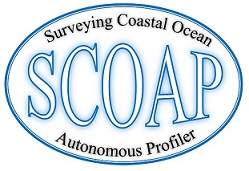
|
Overview SCOAP is an experimental marine autonomous surface craft (MASC), or unmanned surface vehicle, for oceanographic survey work in coastal waters including bays and estuaries. Development of SCOAP is basic research to advance the concept of a robotic boat platform equipped with automated oceanographic sampling devices. The long-term goal is to enable coastal oceanographers to collect field observations with sampling coverage and resolution (both spatially and temporally; see "What's the need?") that exceed what is possible using currently available platforms-- and to do so in a significantly more cost-effective manner. Test trials on pond in Stuart, FL in 2012. Photo: Jim Fontaine, Exeter Science Services. In recent years a number of new MASCs have been developed and demonstrated. However, the few that are capable of operating in relatively shallow coastal and estuarine systems are generally small and have been designed for operations in relatively protected waters with mild sea states and weak currents, such as harbors, and/or for short-duration deployments lasting up to a couple days at most. To address important oceanographic questions scientists need a platform that (a) remains stable in the more challenging sea states of open coastal waters, (b) can host a broad range of sensors that are not necessarily miniaturized nor optimized for low power, (c) can operate over durations of up to weeks at a time, and (d) is suitable for relatively shallow water depths (down to a few meters or less) and the relatively strong currents that typify tidally energetic conditions. SCOAP is designed specifically for these purposes. Improved understanding of coastal oceanographic processes is important for both scientific and practical reasons. Examples of the latter include maritime safety, national defense, and environmental stewardship (for example, water quality management). Field observations, though demanding to collect, form the bedrock on which our knowledge of coastal systems is built. A primary motivation for SCOAP is to advance capabilities of measurement methods. |